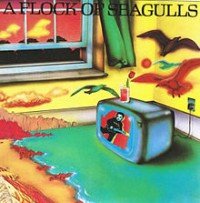Today's punk rock has been broken into sub-sub-sub-genres like blackened grindcore, post-emo skramz and reverse-anarcho-alt-garage-neo-cowpunk. Each of these obscure genres place walls between themselves and everyone else. However, there was a brief moment in time (mostly) in the UK in the early â80s, where non-pop music was simply non-pop music. It was entirely possible to hear the Smiths, Bauhaus, Gary Numan, Joy Divison, Gang of Four, Killing Joke, New Order and A Flock of Seagulls all spinning at the same club.
Yes, that's right, A Flock of Seagulls, a victim and a beneficiary to their own marketing. Numerous Adam Sandler movies and Grand Theft Auto games have, in part, painted A Flock of Seagulls as the archetypical cheesy â80s pop synth band. That's not to say that the band shied away from accepting the neon-yellow, plastic scepter accompanying the role. Indeed, the band released numerous compilations playing up the white polyester blazers and hairspray imagery of the mid â80s. So, if the band are set to receive musical accompaniment to back the tale of their historical placement, surely the instrument used is a violin no larger than a thimble.
But from a critical standpoint, it's a shame because the group's self-titled debut is far more in the realm of post-punk and early experimental electronica than that of Jordache and plastic earrings.
The album opens with "Modern Love is Automatic." A cold rushing wind blows across the speakers before a Berlin-ish synth line descends. An aggressive, but sturdy drum and bass line march forward, not dissimilar to Joy Division's early programmed-music experiments. Finally, vocalist Mike Score sings in a restrained, robotic voice, lamenting that in the modern (â80s) age, emotions are as much driven by marketing and corporate interests as they are true affection. Certainly, such a sentiment is more inline with Zounds than Kajagoogoo.
Likewise, "Modern Love is Automatic" could have been slipped into a mid-period Bauhaus album and no one would have been the wiser. Score somewhat mimics the ghostly wail of Peter Murphy while gothic, intricate guitar work floats in the background. Much like Murphy, Score laments the loss of a love and vows to hold true for all time, giving the slightest of nods towards vampirism - something only a young man could sing and get away with. The song closes with multi-tracked wailing which has, in time, become the stock vocal effect of goth albums.
The album's true masterpiece and darkest cut is "Standing in the Doorway." A Kraftwerkian pulsation starts the piece as the sounds of a machine blip and beep. Then suddenly, a thunderous snap cuts off the machinery and the song tears into what could be called a more punk Tubeway Army jam. As a sinister line creeps in the background, Score screams at an unidentified woman "Standing in the doorway, I can see you!" It's not clear if he's a stalker, or a husband come home too early, but his menace seems genuine. He says little else because really, that's the only threat he needs to make.
Even "I Ran," which is often thought of as thee song of the 80s, becomes a different creature when listened to in the context of its surrounding brothers. Where it has become a song used as the backdrop for cruising one's convertible along a shore line, in isolation, it is a much darker song. Opening with a minor chord synth rumble, the song then snaps forward and tells the tale of grasping for an idealized version of something and unable to grasp. Perhaps because the chorus is so catchy, rarely does the listener stick around for the end, where the guitars crumble before self-destructing in a violent din.
A Flock of Seagulls' first album isn't necessary a long lost punk classic. It's classic, of course, but not strictly punk, or even post-punk. But without question, it has elements of those genres and uses them to their greatest extent. Perhaps that's why this album is so threatening to modern music critique. Instead of giving a full chance to a multi-textured and clever combination of darker music, it's easier to focus on silly haircuts and file it away neatly in a drawer, mislabeled as it may be.
Notes:
-The 2011 Cherry Records re-release of this album is the one to get as it boasts superior sound quality and some great bonus tracks.
-In an instance of cruel irony, thoroughly proving that the universe is ruled by an intelligent being with a Lovecraftian-sense of humor, Mike Score is now entirely bald.
